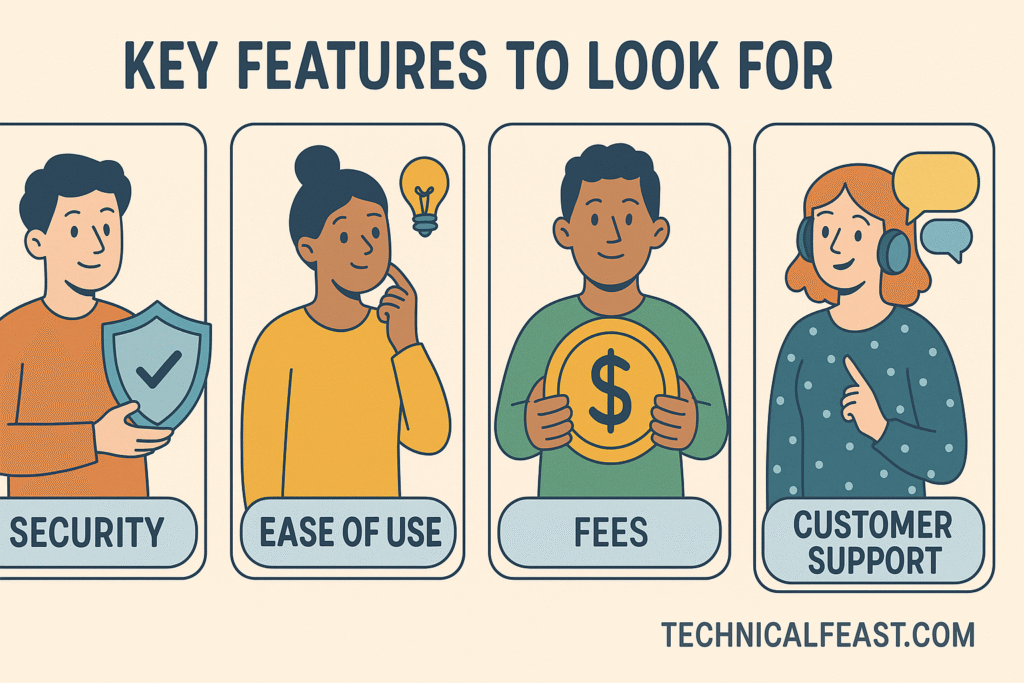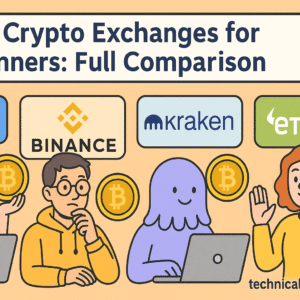Table of Contents
When I first dipped my toes into the world of cryptocurrency, I was overwhelmed by all the exchanges (Coinbase, Binance, Kraken, and more). Choosing the right one changed everything. For example, my first crypto purchase was on Coinbase, and I remember feeling relieved when the interface was as simple as buying something online. A friend who is not tech-savvy started on Coinbase too, saying it felt like using a familiar shopping app. In this guide, we’ll compare the best crypto exchanges for beginners — looking at fees, features, and safety. I’ll share real stories and expert tips so you feel confident from day one.
Think of this as a friendly chat: we’ll break down complex ideas into simple terms. By the end, you’ll know which exchange suits you — whether it’s a super-simple app or a platform with tons of coin options — and how to start trading safely. These tips are meant for beginners everywhere, no matter where you live. Ready? Let’s dive in!
Why Exchange Choice Matters for Beginners
Starting your crypto journey is exciting, but picking the wrong exchange can make things confusing or risky. Beginner-friendly platforms prioritize ease of use: big Buy/Sell buttons, clear dashboards, and guided tutorials. The best crypto exchanges for beginners simplify each step this way.
Security is equally important. Good exchanges lock down your funds with two-factor authentication (2FA), cold storage, and even insurance. For example, Gemini provides pass-through FDIC insurance on USD balances and insurance coverage for cryptocurrencygemini.com, protecting your dollars like a bank. Coinbase likewise keeps nearly all crypto offline with 2FA as a mustbitcoin.com.
Fees also matter. Coinbase charges roughly 0.50% per trade, whereas Binance charges about 0.10%. For very small trades the difference is minor, but over time it adds up.
Exchanges often include learning resources too – for example, Coinbase Earn and Binance Academy offer tutorials that reward you for watching. They also use plain language (like “Buy Bitcoin”) instead of trading jargon. Gemini’s co-founder Cameron Winklevoss famously said they built the exchange because people “don’t want to deal with the effort needed to secure your bitcoins”, highlighting their focus on making security easy for users.
Finally, consider regulation. Large exchanges often follow strict rules. Coinbase and Gemini operate under U.S. regulations, which can give beginners added confidence.
In short: The best crypto exchanges for beginners balance friendliness, clear fees, and strong safeguards so you can trade safely from day one.
Key Features to Look for

When searching for the best crypto exchanges for beginners, focus on these key areas:
- Ease of Use: Look for a clean, intuitive interface. Coinbase and Kraken have simple dashboards with big “Buy” buttons. Binance even offers a Lite mode for beginners, hiding advanced tools.
- Security: Must-haves include 2FA, cold (offline) storage, and insurance. For example, Gemini’s platform has FDIC-insured USD and insured cryptogemini.com.
- Supported Coins: Beginners need top coins (BTC, ETH, etc.). Coinbase lists 250+. If you want more, Kraken has 300+investopedia.com, Binance 600+. (KuCoin lists ~1,000 coins, but that’s riskier for newbies.)
- Fees and Costs: Compare trading and deposit/withdrawal fees. Coinbase charges ~0.50%; Binance and KuCoin charge ~0.10%. Watch out for high card fees.
- Payment Methods: Check how to fund your account. Bank transfers often have low fees but take longer. Credit/debit card buys are fast but charge a few percent. Coinbase and Crypto.com allow cards, Kraken and Binance support many fiat currencies.
- Regulation & Reputation: Choose exchanges known for compliance. Coinbase and Gemini operate under strict U.S. rules. Licensed exchanges follow clear safeguards.
- Support and Resources: Good exchanges offer learning content. Coinbase Learn/Earn and Binance Academy have crypto tutorials. Responsive support (like Kraken’s 24/7 chat) also helps new users.
Use these criteria to narrow your choice. Remember, every beginner has different priorities: some value a buttery-smooth app, others want the best price. No matter your style, one of the exchanges below is likely a fit.
Coinbase: The Friendly Giant
Coinbase is often the first exchange newcomers try. It has an intuitive design that feels like a friendly shopping app. Investopedia praises Coinbase’s “sleek user interface” and calls it “best for beginners”, and NerdWallet notes it’s “one of the most user-friendly crypto apps”. You can trade crypto on web or mobile with big buttons. It even has Coinbase Earn to learn and earn small crypto rewards (a fun bonus).
Coinbase supports over 250 cryptocurrencies, including all the majors. It’s available in 100+ countries (172 globally), so likely in your country too. Security is strong: 98% of coins are held offline, and $250K USD deposits are FDIC insuredbitcoin.com. 2FA is required for logins.
Coinbase also has advanced features behind the scenes: a fully regulated stablecoin (USDC) for low-risk transfers, and a professional trading interface (Coinbase Pro) with lower fees for when you get more experienced. It even launched an NFT marketplace for digital collectibles. Plus, Coinbase is publicly traded (NASDAQ: COIN), adding transparency for its customers.
The downside is fees: Coinbase charges about 0.50% per trade (plus extra spreads), which is higher than many competitors. For a one-time small buy, that’s okay. But for frequent trading it adds up. Some users switch to Coinbase Pro to save, but that platform is meant for advanced traders.
Bottom line: Coinbase is often listed among the best crypto exchanges for beginners because it’s simple and secure. Think of it as the Toyota Corolla of crypto: not the flashiest, but reliable and easy to drive.
Binance: The Global Titan
Binance is like the tech superstore of crypto. Founded in 2017, it quickly became the world’s largest exchange. It offers over 600 cryptocurrencies, and by default charges only 0.10% per trade (even lower if you pay fees in BNB). That low fee, plus lots of coins, is great for traders. However, the standard interface can be complex. Fortunately, Binance offers a Lite mode for beginners, which hides advanced tools and shows only the essentials.
Binance’s CEO Changpeng Zhao emphasizes that they build “secure, user-friendly, and efficient” products. The exchange keeps most funds in separate cold wallets and has a Secure Asset Fund (SAFU) to protect users in emergencies. 2FA and other protections are a must.
Binance also supports dozens of fiat currencies and languages, serving a truly global audience. Beyond spot trading, it offers savings accounts, staking on many coins, and crypto loans for more advanced users (beginners can ignore those for now). Note that while Binance.com is for international users, Americans must use Binance.US (which has fewer coins).
Bottom line: Binance is often counted among the best crypto exchanges for beginners who want low fees and lots of options. Think of it as the Swiss Army knife of exchanges: powerful and versatile. Just turn on Lite mode and secure your account from the start.
Kraken: The Veteran Security Champion
Kraken is one of the oldest crypto exchanges (launched in 2011) and is known for its rock-solid security. In fact, Kraken has never been hacked, and it regularly passes third-party audits. The interface is straightforward: a simple trade page with big buttons, plus an “Advanced” tab if you grow into charting. Kraken supports 300+ cryptocurrenciesinvestopedia.com, including all major coins. It even offers staking (earning interest on tokens) directly on the platform.
Fees on Kraken are quite low: for most users, makers pay 0%–0.16% and takers 0.10%–0.26%cultofmoney.com, which is cheaper than Coinbase. They also handle fiat deposits via bank transfers globally (USD, EUR, etc.), so it’s easy to fund your account. Kraken operates under licenses in the U.S., Europe, and other regionsinvestopedia.com, adding to its trustworthiness.
Kraken was one of the first U.S. exchanges fully regulated by authorities, which is why so many traders trust it. It offers features like margin trading and futures, but as a beginner you can stick to simple buying/selling. For added peace of mind, Kraken even lets you verify your account with video chat if needed – another sign of its strict compliance.
Many users praise Kraken’s customer support and educational materials. One friend was impressed that Kraken’s team replied quickly when she had an account issue. Reliability and support like this give beginners extra confidence.
Bottom line: Kraken combines low fees, a broad coin selection, and the highest security standards. It’s often listed among the best crypto exchanges for beginners, especially if you want a dependable platform. It’s like a sturdy old ship: maybe not flashy, but it will sail safely.
Crypto.com: The Mobile-Friendly All-Rounder
Crypto.com is known for its sleek mobile app and Visa debit card, making crypto feel like everyday finance. With over 417 cryptocurrencies, it has plenty of options. Fees are competitive (0.04% maker, 0.40% taker by default) and drop if you stake the native CRO token. One standout: Crypto.com often runs promotions (like bonus coins for new users or CRO rewards for using the card).
Crypto.com boasts over 100 million users globally. Its native CRO token can be staked for high rewards (sometimes over 10–15%), which can offset fees or boost debit card cashback. The integrated Visa card (in supported countries) makes spending crypto straightforward.
Security is solid. Crypto.com was hacked in 2022 for $34M, but they covered all users with their insurance fund. Now they emphasize 2FA and cold storage.
It’s not available in every country (about 90+ supported), and U.S. support is limited. Also, with so many features (Earn, Pay, NFTs), the app can feel overwhelming at first. If you want simplicity, focus on the basic trade functions. For example, I have a friend in Europe who uses Crypto.com’s debit card for everyday purchases. She loves the cashback perks but is careful not to stake more crypto than she can afford to lock up.
Bottom line: Crypto.com combines a great mobile experience with strong security and good fees. It often appears on lists of best crypto exchanges for beginners, especially for people who want an all-in-one app and card. If you love managing finances from your phone, Crypto.com is hard to beat.
Gemini: Security and Simplicity
Gemini was built with security as a priority. Launched by the Winklevoss twins in 2014, Gemini stores 1:1 reserves for all coins and has FDIC insurance on USD balancesgemini.com. It’s regulated in New York and 70+ countries, which means it follows strict rules. Gemini’s interface is clean and straightforward, making it easy to buy crypto without confusion.
Gemini supports around 80 cryptocurrencies (all major coins and some top altcoins). Fees can be higher on the simple app (around 0.35%–0.40% plus $0.99 minimum). The ActiveTrader platform has lower maker/taker fees (0.00%/0.10% for high volume traders), but is more complex. For beginners making occasional buys, the basic interface is fine.
Gemini runs an educational portal called Cryptopedia to help beginners learn crypto concepts. Its stablecoin (GUSD) is fully backed by USD in bank accounts.
Bottom line: Because of its strong security focus and regulatory compliance, Gemini is often ranked among the best crypto exchanges for beginnersgemini.com. Think of Gemini as a fully armored vault: it might not be the cheapest or have every coin, but you’ll feel very safe using it.
KuCoin: Altcoin Adventures (Proceed with Caution)

KuCoin is a global exchange known for its huge selection of tokens. It officially lists around 1,000+ cryptocurrencies, letting you explore many altcoins not on mainstream sites. Its trading fee is 0.10%. The interface is more technical, but if you’re adventurous, it’s straightforward to place buys and sells once you learn it.
KuCoin runs its own token (KCS) which offers fee discounts and earning opportunities when staked. It also has an Earn platform and occasionally lists new token launch events. However, KuCoin is not available to U.S. residents (they settled with regulators in 2025). It’s based offshore, so it’s less regulated than the others above. Also, KuCoin was hacked in 2020, though they recovered funds and now boast insurance and security measures (2FA, withdrawal whitelist, etc.).
Bottom line: KuCoin has a learning curve and higher risk due to less oversight. I wouldn’t recommend KuCoin as the very first exchange for absolute beginners. It’s sometimes mentioned among the best crypto exchanges for beginners who want many coin choices, but only if they understand the risks. If you try it, use strong security practices and start very small.
Comparison Table: Top Crypto Exchanges at a Glance
| Exchange | Fees (Spot) | User Experience | Supported Coins | Regulation / Countries | Security |
|---|---|---|---|---|---|
| Coinbase | ~0.50% spread (0.99–2.99 USD fee) | Very user-friendly (web/app); easy buy/sell UI | 250+ top cryptocurrencies | US-regulated, available in ~172 countries | Strong (2FA, cold storage; FDIC insured cash)bitcoin.com |
| Binance | 0.10% base (reducible with BNB) | Full-featured UI; Binance Lite for beginners | 600+ coins | Global (excl. US; US residents use Binance.US) | Strong (SAFU fund, 2FA) |
| Kraken | 0.00–0.16% maker; 0.10–0.26% takercultofmoney.com | Straightforward (web/app); Kraken Pro advanced | 300+ coinsinvestopedia.com | Licensed in US/EU/Asiainvestopedia.com | Excellent (never hacked; audited) |
| Crypto.com | 0.04–0.40% (maker/taker) | Sleek mobile app; integrated card and earn | 417+ coins | ~90 countries (not in every region) | Good (2FA, security-focused) |
| Gemini | 0.35–0.40% (simple app) | Clean, simple UI; ActiveTrader pro mode | ~80 coins | US-regulated (50 states) + 70+ countries | Top-tier (FDIC-insured cash, SOC2 audit)gemini.com |
| KuCoin | ~0.10% (maker/taker) | Moderate interface; feature-rich | ~1,000+ coins | Global (not in US; applied for EU license) | Improved (2FA, whitelist, insurance) |
| Bitstamp | 0.50% (<$10K 30d vol) | Very simple, minimalist UI | ~75 major coins | EU/US regulated, longest-running exchange | Very secure (cold storage, compliance) |
(Table: Comparison of fees, UI, coins, regulation, and security for top beginner-friendly crypto exchanges.)
FAQ
Q: Which crypto exchange is best for beginners?
A: It depends on your needs. Many sources cite Coinbase and Kraken as top choices. Coinbase has a very user-friendly interface, while Kraken offers lower fees and strong security. Binance (with its Lite mode) also works well for novices. In short, choose an exchange you trust and that operates in your country.
Q: How much money do I need to start?
A: Very little. Some exchanges let you buy as little as $2–$10 of crypto. For example, Coinbase’s minimum is around $2 (just enough to cover fees). Keep in mind, if you only deposit $10 and pay a $1 fee, that’s a 10% cost. Many beginners start with $50–$100 so fees are smaller in proportion.
Q: Are crypto exchanges safe?
A: Reputable exchanges use 2FA and cold storagebitcoin.com, and Coinbase/Kraken have strong track records. However, no exchange is 100% safe; think of one like a bank – it’s fine for transactions, but you may not want to store large amounts there. That’s why even the best crypto exchanges for beginners advise not to keep all your crypto on the platform long-term.
Q: How do I know if an exchange works in my country?
A: Check the exchange’s website; they usually list supported countries. Major platforms like Coinbase, Kraken, and Binance cover many regions (Coinbase is in 172 countries). Americans often use special versions (e.g., Binance.US). If an exchange doesn’t support your country, look for local alternatives or peer-to-peer options, but be cautious.
Q: Can I rely on customer support?
A: It varies. Larger exchanges have support teams, but you may wait for a response. Good options have detailed FAQs and active community forums. Kraken, for example, is often praised for responsive support. Look for 24/7 chat or help articles when choosing an exchange.
Q: How do I avoid trading mistakes?
A: Start with small amounts and simple orders (market or basic limit orders). Double-check every detail (amount, address, fees) before confirming. Beware of impersonator websites – always verify you’re on the official site. Don’t chase wild promotions or “pump and dump” schemes. Use demo features if available, and ask questions in beginner forums or guides if unsure.
Q: What coins should I consider first?
A: It’s safe to begin with the largest, most established cryptocurrencies: Bitcoin (BTC) and Ethereum (ETH). They have the most liquidity and lowest risk of disappearing. You can also try well-known altcoins like Cardano (ADA) or Solana (SOL) once you’re comfortable. Many exchanges let you buy tiny fractions, so you don’t need a lot of money to start. In fact, the best crypto exchanges for beginners let you buy these coins in small portions, so even $10 can get you going.
Q: Are there any promotions or bonuses?
A: Yes! Many exchanges offer sign-up bonuses or referral rewards for beginners. For example, Coinbase often gives a small amount of Bitcoin to new users who make a qualifying trade. Crypto.com may offer CRO tokens for account setup. Binance frequently has referral programs. These promotions can give you a bit of free crypto, but they usually require completing a registration or trade.
Q: Should I keep my crypto on the exchange?
A: For active trading it’s fine to keep small amounts, but even the best crypto exchanges for beginners recommend moving the bulk of your crypto to your own wallet. Exchanges can be hacked or freeze accounts, whereas a personal wallet (hardware or software) gives you full control. Treat an exchange like a bank: convenient for transactions, but not always the safest place for large, long-term holdings.
Q: What order type should I use?
A: Stick to basic order types at first. A market order buys or sells immediately at the current market price (easy but no price control). A limit order lets you set a price (e.g., buy only if BTC hits a certain level). Avoid advanced orders (like stop-loss) until you fully understand them.




Leave a Reply